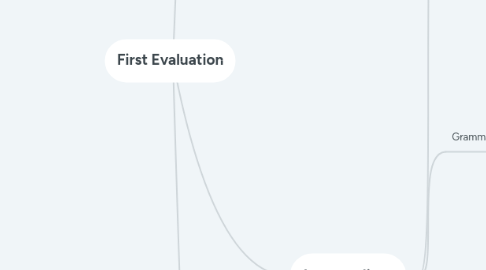
1. Beginner
1.1. Vocabulary
1.1.1. Vocabulary for identifying family members
1.1.1.1. Ex: (mother, sister,...)
1.1.2. Vocabulary for basic verbs
1.1.2.1. Ex: (go, eat, read, …)
1.1.3. Vocabulary for basic objects in the Home and Office
1.1.3.1. Ex: (book, chair, home, office,...)
1.1.4. Vocabulary for Greetings and Leave takings
1.1.5. Common adjectives and their opposites
1.1.6. Vocabulary for genre (genre? Or gender?)
1.1.7. Vocabulary for Talking about dates, days, months - the calendar
1.1.8. Ordinal numbers and saying the time
1.2. Grammar
1.2.1. Articles
1.2.1.1. Ex: a / an / the
1.2.2. Demonstratives
1.2.2.1. Ex: this / that / these / those
1.2.3. Simple present tense
1.2.3.1. Ex: am / is / are first and then other common verbs
1.2.4. Subject Pronouns and determiners
1.2.4.1. Ex: my / his / her / their / your / its
1.2.5. Possessive pronouns
1.2.5.1. Ex: mine, yours, his, hers
1.2.6. Question words
1.2.6.1. Ex: Who, When, Where, How
1.2.7. Prepositions
1.2.7.1. Place
1.2.7.1.1. Ex: in, on, under, between, next to
1.2.7.2. Movment
1.2.7.2.1. Ex: from, to, up, down, along, across
1.2.7.3. Time
1.2.7.3.1. Ex: on, in, at
1.2.8. Simple Past Tense
1.2.8.1. (may need to deal with this in steps was / were first, then regular verbs, then irregular)
1.2.9. Using can and can’t
1.3. Language functions
1.3.1. Exchanging greetings
1.3.2. Identifying and naming items given in the lexical list below
1.3.3. Leave-taking
1.3.4. Indicating the position of people and objects
1.3.5. Describing people, animals, objects and places very simply
1.3.6. Stating simple facts with Informing about possessions
1.3.7. Asking very simple questions about personal details
1.3.8. Describing daily routines and times
1.3.9. Giving dates
1.3.10. Expressing ability and inability
1.3.11. Giving very simple directions and locations
1.3.12. Describing current activities of real people or those in pictures
1.3.12.1. Giving personal information, e.g. name, age
1.3.13. Describing very simply states in the past
1.3.14. Asking simple questions about everyday life
2. Intermediate
2.1. Vocabulary
2.1.1. Adverbs of frequency
2.1.1.1. Ex: sometimes, often, never
2.1.2. Adverbial phrases of frequency
2.1.2.1. Ex: every day, once a week
2.1.3. Expressions of past time
2.1.3.1. Ex: yesterday, last night
2.1.4. Adjectives and adverbials of quantity
2.1.4.1. Ex: a lot (of), not very much, many
2.1.5. Expressions of preference
2.1.5.1. Ex:I prefer, I’d rather
2.1.6. Expressions relating to past and future time
2.1.6.1. Ex: two days ago, in the future, the day after tomorrow, in a year’s time, in … years’ time
2.1.7. The use of contracted forms in Spoken English
2.1.7.1. Ex: I’ve been to, I’ll etc
2.2. Grammar
2.2.1. Past simple tense - using common irregular verbs
2.2.2. Future Tense
2.2.2.1. Ex: going to / will
2.2.3. Like + gerund/infinitive
2.2.3.1. Ex: I like shopping, I like to read books
2.2.4. Adverbs of manner and frequency
2.2.5. Comparatives and superlatives of adjectives
2.2.6. Link words
2.2.6.1. Ex: and / but
2.2.7. Present perfect tense
2.2.7.1. Ex: with, for, since, ever, never, just
2.2.8. Connecting clauses using "because"
2.2.9. Future continuous
2.2.10. Zero and first conditionals, using if and when
2.2.11. Past continuous tense
2.3. Language Functions
2.3.1. Talking in detail about past events
2.3.2. talking about future plans and intentions, informing and predicting
2.3.3. Expressing simple comparisons
2.3.4. Expressing likes and dislikes
2.3.5. Describing manner and frequency
2.3.6. Expressing preferences
2.3.7. Talking about events in the indefinite and recent past
2.3.8. Giving reasons
2.3.9. Stating the duration of events
2.3.10. Quantifying
2.3.11. Expressing and requesting opinions and impressions
2.3.12. Expressing intention and purpose
2.3.13. Expressing obligation and necessity
2.3.14. Expressing certainty and uncertainty
2.3.15. Describing past actions over a period of time
3. Advance
3.1. Vocabulary
3.1.1. Modals connected to the functions
3.1.1.1. Ex: must, need to, might, don’t have to
3.1.2. Infinitive of purpose
3.1.2.1. Ex: to read, to take etc
3.1.3. Common phrasal verbs
3.1.4. Linking expressions
3.1.4.1. Ex: even though, in spite of, although
3.1.5. Cohesive devices
3.1.5.1. Ex: so to continue, in other words, for example
3.1.6. Idioms
3.1.7. Proverbs
3.2. Grammar
3.2.1. Second conditional
3.2.2. Simple passive
3.2.3. Used to
3.2.4. Relative clauses
3.2.5. Modals and phrases used to give advice and make suggestions
3.2.5.1. Ex: should/ought to, could, you’d better
3.2.6. Modals and phrases used to express possibility and uncertainty
3.2.6.1. Ex: may, might, I’m not sure
3.2.7. Discourse connectors
3.2.7.1. Ex: because of, due to
3.2.8. Third conditional
3.2.9. Present perfect continuous tense
3.2.10. Past perfect tense
3.2.11. Reported speech
3.2.12. Verbs followed by gerund and/or infinitive
3.2.12.1. Ex: forget, stop, go on, remember
3.2.13. Correct verb patterns after wish and hope
3.3. Language Functions
3.3.1. Giving advice and highlighting advantages and disadvantages
3.3.2. Making suggestions
3.3.3. Describing past habits
3.3.4. Expressing possibility and uncertainty
3.3.5. Eliciting further information and expansion of ideas and opinions
3.3.6. Expressing agreement and disagreement
3.3.7. Expressing feelings and emotions
3.3.8. Expressing impossibility
3.3.9. Reporting the conversation of others
3.3.10. Speculating
3.3.11. Persuading and discouraging
3.3.12. Expressing regrets, wishes and hopes

